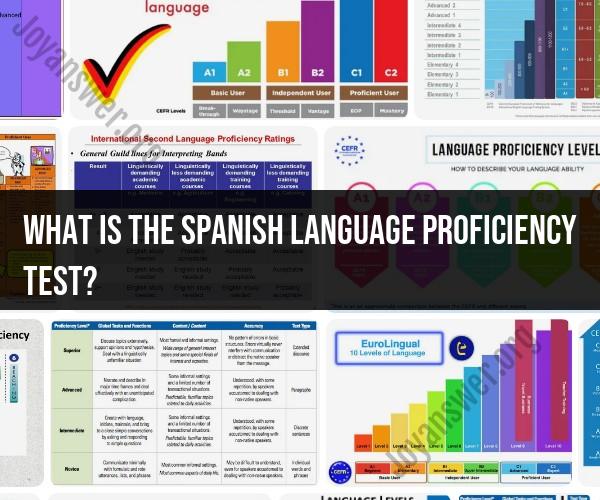What is the Spanish language proficiency test?
The Spanish Language Proficiency Test is designed to assess your ability to understand, speak, read, and write in the Spanish language. These tests vary in format and content, but I can provide you with a general overview of what to expect:
1. Test Format:
- Listening Comprehension: You'll listen to conversations, speeches, or recordings and answer questions based on what you heard.
- Reading Comprehension: You'll read passages or texts and answer questions about their content.
- Writing: You'll be asked to write essays, responses, or short paragraphs on specific topics.
- Speaking: Some tests include an oral component where you might have to record yourself responding to prompts or engage in a conversation with an examiner.
2. Test Levels:
- Tests are often divided into proficiency levels, such as beginner, intermediate, and advanced.
- Some tests align with the Common European Framework of Reference for Languages (CEFR), which has levels ranging from A1 (beginner) to C2 (proficient).
3. Topics Covered:
- Vocabulary and Grammar: Expect questions related to vocabulary usage, verb conjugations, sentence structure, and other grammar concepts.
- Cultural Context: Some questions might involve understanding cultural nuances and idiomatic expressions.
4. Duration:
- The test duration varies based on the proficiency level and the specific test format.
- Commonly, the test can range from 1 to 3 hours.
5. Preparation:
- Review grammar and vocabulary relevant to your expected proficiency level.
- Practice listening, reading, writing, and speaking skills regularly.
- Use language learning resources like textbooks, online exercises, and language exchange platforms.
6. Test Scoring:
- Scoring criteria differ, but generally, you'll receive points for correct answers.
- Some tests might assess not only correctness but also fluency, coherence, and vocabulary richness.
7. Test Providers:
- Different organizations and institutions offer Spanish language proficiency tests. Some well-known ones include the DELE (Diplomas of Spanish as a Foreign Language) and the AP Spanish Language and Culture exam.
8. Registration and Cost:
- Registration procedures and costs vary depending on the test provider and location.
- Some tests might be available online, while others require physical attendance.
9. Importance:
- Spanish proficiency tests are often used for academic purposes, employment opportunities, or immigration requirements.
- Some universities and employers might require a specific proficiency level for admission or hiring.
Remember, the key to performing well on a Spanish language proficiency test is consistent practice and preparation. Familiarize yourself with the test format, study the relevant grammar and vocabulary, and practice your listening, reading, writing, and speaking skills. Taking practice tests can also help you become comfortable with the test structure and improve your time management skills.













